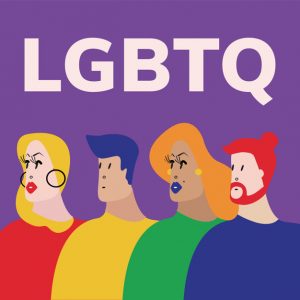VCU Libraries launches guides for LGBTQIA+ Health
VCU Libraries offers two new online guides that provide information to support the health of people who identify as LGBTQIA+.
- The provider guide includes resources for providing effective and inclusive care for LGBTQIA+ patients.
- The community member or patient guide includes information about health and wellness specific to people who identify as LGBTQIA+.
Why are these guides needed?

LGBTQIA+ populations are vulnerable, especially with respect to social determinants of health. They experience discrimination and violence in the absence of sufficient social services (The Health of Lesbian, Gay, Bisexual, and Transgender People: Building a Foundation for Better Understanding). These groups are disproportionately affected by HIV, substance abuse disorders, and mental health issues, including suicide. In addition, people who identify as LGBTQIA+ have difficulty accessing health care and finding providers who are sensitive to their needs; this is especially true for those identifying as transgender or gender nonconforming (When Health Care Isn’t Caring: Transgender and Gender-nonconforming People Results from Lambda Legal’s Health Care Fairness Survey).
Erica Brody, Research and Education Librarian at the Tompkins-McCaw Library for the Health Sciences took the lead on creating these guides after realizing that she wanted to have an online resource about LGBT health for dental and dental hygiene students. When Brody brought the idea to Deputy Director, Emily Hurst, she suggested broadening the scope of the project to include a guide for community members in addition to health services providers. Collaborating with, Dana Ladd, Health and Wellness Librarian, Brody aimed to develop guides that provide a holistic view of LGBT health. For example, the guides provide information about health issues that disproportionately affect people who identify as LGBT, as well as information about wellness, social support groups and how to talk to one’s doctor.
Building on the work of librarians from other academic medical centers, Brody reviewed similar guides from the University of North Carolina at Chapel Hill, Illinois University, Stonybrook University, and University of Michigan to identify an initial set of resources for consideration. Additional items were obtained by searching the VCU Libraries collection and a list of local organizations and support groups developed by VCU Health’s Safe Zone trainers, Alessandra Robertson and Lauren Connelly. Preliminary drafts of the guides were reviewed by members of the VCU community with subject matter expertise by training and/or lived experience.
Initial feedback includes the following comments:
- “The guides seem comprehensive and easy to use; also works great on a cell phone. I am so glad VCU has this resource. I will make all of our residents aware of this resource.” Christopher Kogut, Department of Psychiatry, VCU Health
- “Thank you for your work on this very important resource!” Lisa Webb, Assistant Vice President, Strategic Initiatives and Health Sciences Education
To promote these new guides, Brody and Ladd conducted a hybrid webinar/in-person workshop to provide an overview of the information included. In addition, Donna Coghill, Community Engagement Librarian and Coordinator of Campus Partnerships, shared links to the new guides on the listserv for Equality VCU, a collaborative, advisory and advocacy body representing the aspirations and concerns of the LGBTQIA communities affiliated with VCU. She also shared it with the Trans Sensitivity in Policing Context training team and various local organizations.
Health information is always evolving, so the guides will continue to improve as links become obsolete and new information needs apparent and new resources available. To help in this effort, VCU Libraries welcomes suggestions from the VCU community.
Image: The Queer Community LGBTQ vector illustration from rawpixel.com
Categories Collections, Dentistry, Faculty/Staff, Librarians at Work, News